Totectors
A simple name, but one which is the byword for excellence, reliability and, above all, safety throughout industry, mining, the services and indeed any occupation where safety footwear is essential. Totectors is the name for safety footwear. A recent survey revealed something Totectors has known for a long time, the fact that many wearers of safety footwear believe they buy Totectors even though they may be wearing the product of a rival company. Such is the strength of the name that Totectors literally means 'safety footwear' to everyone.
1985 is Totectors' Centenary Year and there is every reason to celebrate. From humble beginnings in tiny premises in Rushden High Street and one man's dream, Totectors has grown into the largest employer in the town, achieved notable sales in over fifty countries and, most importantly, prevented literally thousands upon thousands of serious injuries in the workplace. The number of man hours saved is incalculable. It must run into millions!
|
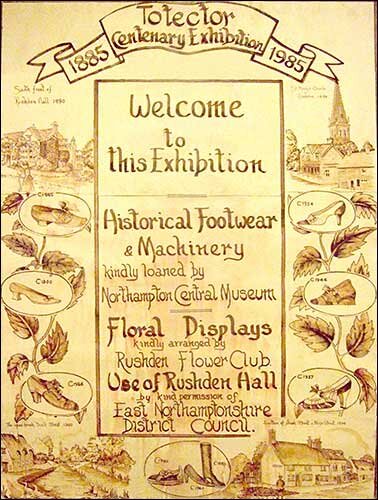 |
|
A beautiful hand-drawn Centenary Poster
|
|
The Birth of a Dynasty (1840-1908)
The foundations of Totectors as we know it today were laid in 1885 with the formation of Wilkins and Denton. The roots of this union however stretch back some forty-five years previously, to the day in 1840 when the remarkable Mr Benjamin Denton of Stanwick announced his intention of opening a bootmaking business.
A potentially hazardous decision but one which Denton approached with optimism and determination.
Locating suitable premises has always been a perennial problem in business and Denton fell prey when he failed to obtain the land he had earmarked in Higham Ferrers.
However, being a man not easily put off, he persevered until he secured a building in Rushden High Street.
Shortly afterwards, his new shoemaking business was trading. It was later followed by a complementary currying business (the process of filling vegetable tanned leather with wax for waterproofing and durability), which itself traded successfully until the 1930's.
|
|
|
|
|
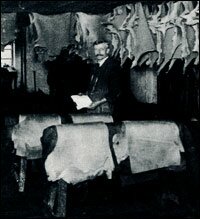 |
|
Inside the leather treatment store
|
|
|
|
|
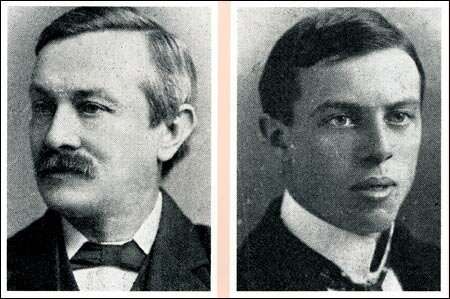 |
|
The first George Denton and George Denton junior
|
|
Like his descendants who were to follow him into the business, Benjamin Denton was both a visionary and a shrewd businessman. He revolutionised the footwear trade in Northamptonshire with the introduction of the factory system for the first time.
Until then, shoe and bootmaking in the area was still something of a cottage industry with every stage being completed by hand.
As the Denton footwear business prospered, so did the family. Benjamin's sister married one of the founders of Lilley and Skinner, and in 1867 Denton was joined by his son George, and the business renamed B. Denton and Son.
George Denton was the first of a trio of Georges who were to dominate the business for more than a century. He was to prove to be as shrewd and successful as his father.
|
The footwear industry at this tune was undergoing tremendous change. A new labour saving machine, the Blake Sewer, appeared on the market and. seeing its enormous possibilities, the formidable Dentons purchased the first one in Rushden.
The function of the Blake Sewer was to quickly and efficiently attach the soles to the uppers. The machine was a sensation. For the tirst few days of its use the machine and its operator had to be locked up to ensure their safety, such was the alarm amongst the Denton workforce. All fears of violence, however, soon subsided when it was explained that the Blake Sewer would greatly increase output and provide more work for everybody.
In 1873, after thirty-three years in the business, Benjamin Denton died. His legacy was a thriving factory and the beginnings of what was to become a household name.
Six years at his father's side had been the ideal apprenticeship for George, allowing him to take full control with confidence. He was to spend the next twelve years conscientiously consolidating the business.
Steadily and successfully the business developed until the famous landmark in its history occurred that was to change its course forever.
|
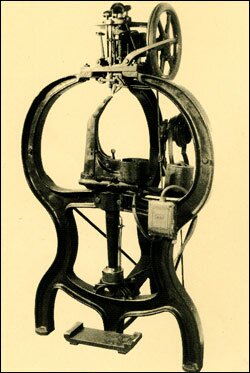 |
|
The Blake Sewer
|
|
|
|
The year was 1885 and George Denton joined forces with a certain Mr Wilkins who had started a wholesaling business in Bishopgate in London, with the idea of developing B. Denton and Son further. Christened Wilkins and Denton and operating independently of B. Denton and Son, a new company was bom. Wilkins and Denton heralded a new age in the footwear business. The concept of a joint manufacturing and marketing approach was a modern one and in the decades that followed Wilkins and Denton proved particularly adept exponents of it.
|
|
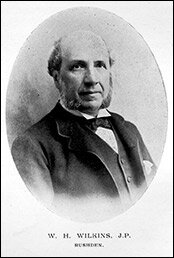 |
|
W H Wilkins
|
|
Previously B. Denton was selling direct to a wholesaler, but now there was a distinct linking of the production of the footwear and industrial distribution via Wilkins and Denton.
Over the century that followed the operation was to be refined and perfected leading to the excellence of Totectors as it is known today.
Operating from the London premises, to which footwear was supplied from the Rushden factory. Wilkins and Denton soon acquired contracts to produce large quantities of army boots, slip-on shoes for the inmates of asylums and sandals intended for native workers in the African Colonies
The London premises were a typically shrewd investment. They provided an excellent marketing base for the thriving B. Denton and Son and, being spot on the border of the City of London and its neighbouring borough, were subject to two different sets of rates and regulations which gave Wilkins and Denton the best of both economic worlds.
B. Denton and Son went from strength to strength. The main factory in Rushden was supplemented by a second at nearby Irchester making boys' footwear. Legend has it that in the early years it was the responsibility of one of the managers to harness up a pony and trap and deliver the weekly wages from Rushden to Irchester. A simple enough task, but one which caused great consternation from those waiting to be paid. The problem being that the manager concerned insisted on breaking the journey to take lunch at his favourite hostelry some six miles away. As a connoisseur of fine ales, his lunches often extended beyond the regulation one hour, often continuing until the early evening. His long-suffering pony, however, did not seem to mind because it generally had to find its own way back from Irchester to Rushden drawing the trap in which the manager quietly slept off the pleasant excesses of his day.
|
On a War Footing (1908-1944)
B. Denton and Son became a Limited Company in 1908. George was joined at the helm by his eldest son, the second of the trio of Georges They were to guide the company through the First World War, during which the huge demand for army boots kept the company stable. By the end of the war George junior was virtually running the business and in 1922 took over full control.
His son, George Henry, last of the trio, had meanwhile decided he was not yet ready to follow his father and grandfather into the business. He packed his bags and left to travel the world.
Prior to the First World War, the Irchester Factory was managed by the first George Denton’s younger sons, John and Bill who were twins. Famed as first class cricketers, they were heroes of the Northamptonshire county side, both being prodigious run-getters. Bill once scored an unbeaten 230 and John who was also an effective bowler, had a tally of 67 wickets. The sporting exploits of these twin brothers are still recounted with proud affection by Northamptonshire members.
Post war jubilation was followed by the depression of the twenties and thirties. Hardship and unemployment touched the lives of many people. As the fortunes of the company dwindled, so did the health of the second George Denton.
Rejuvenation of the company came in the form of George Henry Denton as his father's health faded, urgent messages were sent around the world to young George. The company was in trouble. He was needed. He returned to Great Britain to assume the mantle of Managing Director in 1931 as a youthful twenty-six year old after having travelled the world twice.
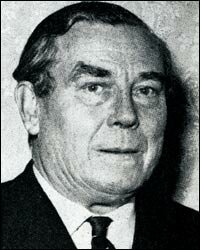 |
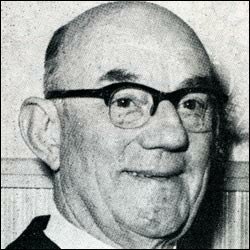 |
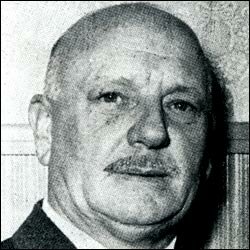 |
|
George Henry Denton
|
Len Bryan
|
Frank Brown
|
|
|
His travels had taught him the need for enthusiasm and committed teamwork and to this end he recruited a friend he had first met in New Zealand, Len Bryan, as Sales Director. Frank Brown, who had joined the company as a very young man and was to serve for fifty years, became Company Secretary and a Director, and in later years, Chairman. They were a formidable team.
The work of the Denton, Bryan and Brown team led to George’s election as President of The British Footwear Manufacturer’s Federation. He was to found and guide Rushden Distributors, part of a Ministry scheme to promote austerity to help the war effort, which between 1943 and 1946 refurbished 1½ million pairs, of reusable boot uppers.
|
Wilkins and Denton moved quietly into spacious new premises, at Bunhill Row in London. As fate will, it took an untimely hand when the entire building was completely destroyed in the Blitz of 29th December 1940.
All that remained of the entire Wilkins and Denton operation was a lump of metal the size of a fist. This had been the safe in which was stored all the company records. But all was not lost. Prudent as ever, Mr H G Wilkins, son of Wilkins the founder, always kept a duplicate set at his St Albans home, a safe distance away.
Within a couple of days after the disaster, Wilkins and Denton was back in business, housed in borrowed premises at Granville Square, London. By 1944, George and his team had put
B Denton and Son Limited well and truly on the map and the scene was set for a dramatic new era, the arrival of the steel safety toecap and one of the most astonishing card games ever!
|
|
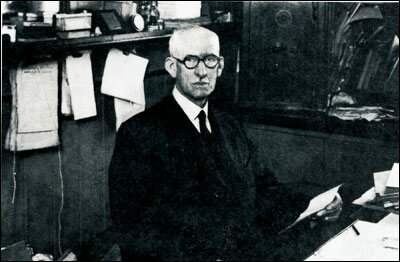 |
|
H G Wilkins
|
|
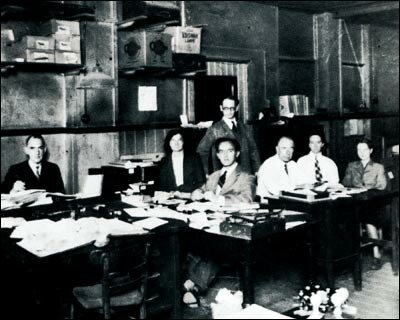 |
|
In the counting house
|
|
If the Cap Fits (1944-1974)
George Denton's imagination had first been fired by the possibilities of the steel toecap when early examples arrived from the United States in 1938.
They were the invention of an eccentric American named Arthur Williams, a tenacious terrier of a man with the reputation of being notoriously difficult to deal with.
Denton was determined to secure the British rights of Williams' invention, despite the many warnings that the owner would be a very tough nut to crack. But before negotiations could begin, the protagonists became involved in a greater struggle as the Second World War intervened.
|
|
|
|
|
read about a pair of boots
|
|
As the war progressed, the Ministry of Labour was faced with a serious and unforeseen problem. It was a problem which was to inadvertently provide Denton with the future direction of the company. With many miners engaged in the armed forces, inexperienced labour was recruited in an effort to maintain outputs of vital coal. The incidence of foot injuries was increasing dramatically A programme of accident prevention was urgently needed.
In 1944, the Ministry arranged for George in to cross the Atlantic to tackle Arthur Williams. Denton undertook the hazardous voyage intent on doing whatever it took to secure the rights of the patented steel safety toecap, despite the close guard maintained on it.
What happened next has become legend. Williams refused to talk business but took the unprecedented step of inviting Denton to his New England home for the weekend.
"After I arrived” George later recounted, “he asked, 'Can you play cribbage?' I said yes and we played solidly all day Saturday, and on the Sunday started again immediately after breakfast. Still he refused to talk business. When the time came to put me back on the train to catch the boat back to England, just as the train was about to leave he turned to me and said, 'I like you. You can have it”.
|
|
|
Production of safety footwear commenced in 1944 soon after George's return from America and the signing of an agreement with the Safety Box Toe Company of Massachusetts to act as its sole distributor in England and, what was then, The British Empire.
At the insistence of the Board of Trade the toecaps were made available to other footwear manufacturers and large quantities were soon being manufactured in Birmingham.
Shortly after the war, the distribution activities of Wilkins and Denton were moved to new warehouse premises in Rushden. A sales office was maintained at Wobum Place in London. But later, all departments moved into the expanding Rushden headquarters.
|
A new subsidiary company was formed, International Safety Products Limited, to market and supply their steel toecaps to the consortium of other leading manufacturers who, until the early 1950's, shared the market rights.
The name of Totectors was created and registered by Wilkins and Denton Limited and the 1940's and 1950's saw the development of its safety footwear business towards its enviable current position.
From 1966 to 1968, Wilkins and Denton Limited was slowly absorbed by the massive Guest Keen and Nettlefold Group and an exciting era drew to its natural close with the retirement of the third George Denton in 1970.
|
|
Best Foot Forward (1974-1985)
In 1974, B. Denton and Son Limited, Wilkins and Denton Limited and their various subsidiaries, were united under the banner of Totectors Limited. Additional premises were acquired at Rushden in 1978 and converted into Clicking and Closing rooms. (The term 'clicking' derives from the distinctive noise made when the hand-held knife used for cutting leather components clicked against the metal template.)
As throughout its history, Totectors remains as a leading innovator in the footwear industry. Amongst the many 'firsts' achieved in recent years has been the introduction of double-density sole construction. This process provides for the moulding of a soft comfort interlay plus a tough and durable polyurethane hazard resistant sole in one operation to give maximum wearer comfort and protection.
|
|
|
|
|
The Totectors safety footwear range now boasts 56 standard styles plus hundreds of special application models.
Customer service has always been an important consideration (especially with clients like the Royal Navy's Devonport Gun Crew relying on Totectors), but even this has now been improved upon with the introduction of a computerised stock and production control system. A computerised on-line order processing system ensures that delivery of orders is now possible within 48 hours by Securicor. Depots in Scotland and Northern Ireland improve this service yet more.
In addition, a fleet of Totectors mobile shops visits customers nationwide to enable safety footwear to be issued on site. On one famous occasion, some three hundred pairs were distributed from one mobile shop at the Swann Hunter shipyard in ten minutes!
Since the 1960's, Totectors has marketed a wide range of general safety items and this has been significantly extended to include the very latest developments in industrial safety workwear and personal protection. The company is now in the forefront of 'head to toe' protection at work.
Totectors is a licensed Kitemark manufacturer with British Standards BS 5750 approval. Its entire range of safety footwear and protection workwear meets the appropriate British Standards. In addition, all wearers of Totectors safety footwear are entitled to free insurance against foot accidents and special commemorative awards are made to any wearer whose feet are saved from serious injury by Totectors.
Totectors has an enviable reputation worldwide which has grown rather more in the past forty years from the solid foundations laid down in 1885 and beyond. Over half a million pairs of safety footwear leave the Rushden works every year, every pair made to the high standards which have been the company's benchmark since the days of Benjamin Denton.
|
|
|
|
Totectors is secure for a long time to come and it enters its second century of success with no less determination than has been so amply demonstrated throughout its first 100 years.
Remember the name. At some time in the future you may have a good reason to be grateful to it.
|
|
|
 |
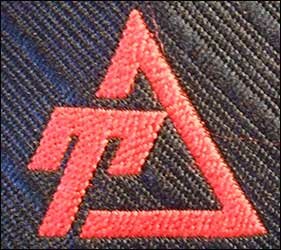 |
The Totectors Tie with the company logo.
The tie was made locally by Tudor Ties.
|
|
|
|
These photos were taken by Vic Childs - he tried to record buildings that were about to be demolished in the 1980s & 1990s
|
|
|
|
|
Part of the works in Duck Street next to Imperial House
|
Imperial House c1989
|
|
|
|
|
Behind the above - a shop in Carnegie Street - sold 'seconds' safety shoes and safety clothing
|
Another Totectors building in Station Road - to the right of it there was a walk way through to Imperial House in Duck Street
|
|
Note: The firm continued to supply a full range of safety equipment and also opened a shop at the factory where they sold the second quality shoes to locals, at greatly reduced prices. Many self-employed workers in the town went to buy their work shoes there, along with other saftey requirements.
A move to a purpose built factory on the Crown Estate outside the town centre and near the A45 for easy distribution, came in about 1990. Again, there was a factory shop and it was still very well used, and they had several mobile shops for travelling around the country to take their wares to other factories, where the workers could purchase their Totectors.
The factory closed in about 2000.
|
|
|
|
|
|
Did you work for Totectors? Have you any memories or photographs to share? Please contact us.
|
|
|